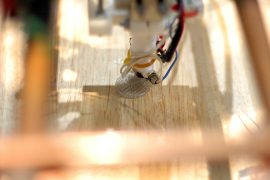There are two Widening Participation Network seminars coming up on 12 and 13 October 2017.
Indigenous students’ experiences of higher education: rippling stories of success
On Thursday 12 October from 2-3 pm, please join us for a presentation by Dr Jack Frawley. He will report on a 2016 National Centre for Student Equity in Higher Education funded research project, and the recently published book Indigenous Pathways, Transitions and Participation in Higher Education: From Policy to Practice, which he co-edited.
Self-efficacy is a significant variable in student learning because it affects students’ motivation and learning. Self-efficacy is defined as beliefs about one’s own ability to be successful in the performance of a task and includes mastery experience, vicarious experience, social persuasion, and emotional arousal (Bandura 1977). The Rippling Stories of Success project addressed widening participation questions and issues by focusing on narrative accounts of Indigenous students’ successful transition into and completion of higher education studies.
The book Indigenous Pathways, Transitions and Participation in Higher Education: From Policy to Practice brings together contributions by researchers, scholars, policy-makers, practitioners, professionals and citizens who have an interest in or experience of Indigenous pathways and transitions into higher education. Those who choose to pursue higher education should do so knowing that there are multiple pathways into higher education and, once there, appropriate support is provided for a successful transition. The book outlines the issues of social inclusion and equity in higher education, and the contributions draw on real-world experiences to reflect the different approaches and strategies currently being adopted. Focusing on research, program design, program evaluation, policy initiatives and experiential narrative accounts, the book critically discusses issues concerning widening participation.
Dr Jack Frawley has a national profile as researcher and writer in the areas of leadership and intercultural studies evidenced by his involvement in significant research and professional projects, book chapters, refereed articles and other publications. He has presented at several national and international conferences and continues to publish on, and participate in, intercultural-related research projects, professional programs and consultancies. Jack is Academic Leader – Knowledges, at the University of Sydney’s National Centre for Cultural Competence, and holds Adjunct appointments at the University of Canberra and the Batchelor Institute. In addition to his academic publications Jack has also exhibited and published on the intersections between art, literature, music and sport. He has worked extensively in Aboriginal Australia as well as the South Pacific and Southeast Asia. Jack has lived and worked on-and-off in Cambodia over several years, primarily as a NGO consultant.
Register for Jack Frawley's seminarIndigenous Methodologies: Storying the success of first in the family students
On Friday 13 October from 10-11 am, Dr ‘Ema Wolfgramm-Foliaki from the University of Auckland will give a seminar titled Indigenous Methodologies: Storying the success of first in the family students
This research presentation is about pioneers: people who are first in their family to enrol in university (FIFU) and succeed. Much research mulls over factors affecting participation and achievement in higher education, but there is little known about the factors that influence the success of FIFU students, and almost nothing on those who are from minority backgrounds. ‘Ema focuses here on Māori & Pacific Island communities. This project is positioned from a strength-based perspective where established indigenous research frameworks and protocols are privileged in the research design in order to encourage first in the family students to story their journey into and through the university. By privileging indigenous forms of knowledge and ways of being we assert the critical role that culture plays in the success of FIFU and indigenous students. This project addresses the need to critically examine the role of universities in recruiting, retaining and supporting FIFU students to succeed.
The project’s analysis of students’ narratives revealed a number of themes that will be covered in this presentation; the importance to Maori & Pasifika families of one of their family venturing into the ivory tower; the contribution of family and friends to their journey; the notion of success, institutional structure and practices that help and/or hinder FIFU success. This presentation will also offer strategies for engaging with FIFU students who are from indigenous backgrounds.
Dr ‘Ema Wolfgramm-Foliaki is a Lecturer in the Centre for Learning & Research in Higher Education at the University of Auckland. Her current research work is on widening participation for minority and first in the family students’ success. ‘Ema was part of the project ‘First in the family students succeeding in universities’, a global collaboration among university colleagues from Auckland, Sydney, Cape Town, and Thompson Rivers, Canada. The project was funded by the Worldwide Universities Network and supported by each of the partner universities, and resulted in a book forthcoming in 2018, Understanding Experiences of First Generation University Students: Culturally Responsive and Sustaining Methodologies. ‘Ema is of Tongan descent and is first in her family to graduate from university and work in academe.
Register for 'Ema Wolfgramm-Foliaki's seminarThe Widening Participation Network is a joint initiative of the Widening Participation and Outreach team and the Education Portfolio.





